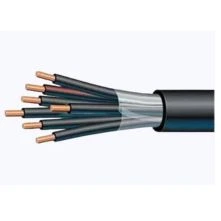Get A Quote
BIS Certification for Elastomer Insulated Cables– IS 9968 (Part 1)

Elastomer
insulated cables, designed for working voltages up to 1100 V, are known for
their flexibility, resilience, and resistance to environmental stressors.
Widely used in industrial, commercial, and utility applications, these cables
feature elastomer insulation that provides superior durability and electrical
insulation. BIS certification under IS 9968 (Part 1) sets rigorous quality
standards for elastomer insulated cables, ensuring safe and reliable
performance across a range of demanding electrical environments. The
certification assures consumers that the cables meet national safety and
durability standards, making them a dependable choice for electrical
installations.
Introduction
The
Bureau of Indian Standards (BIS) mandates certification for elastomer insulated
cables used in electrical installations operating up to 1100 V under IS 9968
(Part 1). These standard outlines essential requirements for cable safety,
insulation quality, and durability, helping to ensure the safe and efficient
transfer of electricity. BIS certification, indicated by the ISI mark, is
required for manufacturers who wish to market these cables in India, affirming
the products meet national standards for electrical applications.
Why is BIS Certification Necessary for Elastomer
Insulated Cables?
BIS certification for elastomer insulated cables is crucial for ensuring high safety standards and electrical reliability. Given the environmental stresses and electrical demands that these cables face, compliance with IS 9968 (Part 1) is essential to ensure protection against factors such as electrical failure, degradation, and mechanical wear. BIS certification confirms that these cables meet required insulation and performance standards, providing users with added confidence in their safety, longevity, and effectiveness for various applications.
Overview of Indian Standard IS 9968 (Part 1)
Indian
Standard IS 9968 (Part 1) specifies the safety, durability, and performance
requirements for elastomer insulated cables designed for working voltages up to
1100 V. The standard ensures high-quality elastomer insulation to protect
against electrical hazards, moisture, and other environmental factors. It
mandates the use of high-grade conductors for efficient power transmission and
reduced energy loss. The cables must also maintain thermal stability,
withstanding high temperatures without degradation. Additionally, the standard
emphasizes mechanical strength and flexibility, ensuring the cables can endure
bending, twisting, and physical impacts, making them suitable for industrial
and mobile applications. Environmental resistance is another key aspect, as the
cables must resist moisture, chemicals, and UV radiation, ensuring their
longevity and reliable performance in varied conditions.
Process for BIS Certification
The BIS
certification process for elastomer insulated cables under IS 9968 (Part 1)
includes the following steps to verify compliance with Indian standards:
- Application Submission: Manufacturers must submit
an application form along with the required technical documents, detailing
the cable’s specifications and safety features.
- Document Review: BIS reviews the submitted
documents to ensure they meet IS 9968 (Part 1) requirements.
- Factory Inspection: BIS conducts a factory
inspection to assess the manufacturing process, quality controls, and
adherence to safety protocols.
- Sample Testing: Product samples are tested
in BIS-approved laboratories to confirm compliance with insulation,
durability, and electrical conductivity standards as per IS 9968 (Part 1).
- Certification Grant: Upon successful testing and
inspection, BIS grants certification, authorizing the manufacturer to use
the ISI mark on the cables.
Documents Required for BIS Certification
To apply
for BIS certification, manufacturers must submit the following documentation:
- Application form
- Detailed product
specifications and technical details
- Quality control plan and
manufacturing process documentation
- Test reports from
BIS-approved laboratories
- Factory layout and equipment
specifications
- Proof of business
registration
- Declaration of conformity to
IS 9968 (Part 1) standards
These documents demonstrate that the manufacturer’s production process aligns with required safety and performance standards.
BIS ISI Mark Certification Costing And Timeline
To Know The Process in Detail, Please Visit:
- BIS ISI Mark Certification for Domestic Manufactures
- BIS ISI Mark Certification for Foreign Manufactures
Under BIS Registration Products ISI and CRS
Conclusion
BIS
certification under IS 9968 (Part 1) for elastomer insulated cables is
essential to ensure adherence to national safety and durability standards,
offering consumers reliable protection and high performance in electrical
installations. By obtaining BIS certification, manufacturers can showcase the
quality and safety of their products, enhancing market credibility and consumer
trust. EVTL India offers expert consultancy services, assisting manufacturers
throughout the BIS certification process to ensure a successful and compliant
product launch. With EVTL India’s guidance, manufacturers can efficiently meet
certification requirements, ensuring their cables are market-ready and meet BIS
standards.
Free Call Back
Latest News & Update
📅 BIS Critical Component List (CCL) Updates for Solar PV Modules
🕒 BIS Fee Concessions for MSMEs and Startups | EVTL India
📅 Guidelines for Implementation of Essential Requirements for Security of CCTV
🕒 Omnibus Technical Regulation (OTR) Amendment Order, 2025
🕒 Extension of Timeline for Filing Annual Returns by Battery Producers
📅 Extension of Timeline for Filing Quarterly and Annual Returns for E-Waste
🕒 Extension of Concurrent Running Period for IS 302-1: 2008 and IS 302 (Part 1): 2024
🕒 BIS Guidelines for Grant of Licence (GoL) | EVTL India
📅 CPCB Guidance on filing of Application, Fees and more
🕒 CPCB Notification on Labelling of Plastic Packaging
📅 Mandatory Compliance for Input Materials of Steel and Steel Products for Imports
🕒 BIS Guidelines for Scheme-X Certification for OTR-Regulated Products
📅 BIS Upgrades Product Certification License Numbers to 10-Digit Series
🕒 BIS Certification No Longer Mandatory for 14 Chemical & Polymer Categories
Why Choose EVTL INDIA
Expertise in Indian Regulatory Standards
End-to-End Support
Trusted by Top Indian & Global Brands
Fast Processing & Transparent Pricing
Strong Liaison with Indian Authorities
Company Profile














